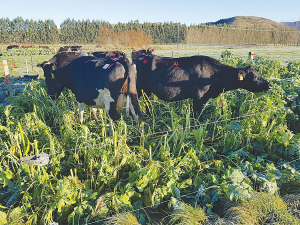DairyNZ Calls for Changes to Government’s Proposed Resource Management Act Reform
DairyNZ says the Government’s proposed Resource Management Act reform needs further work to ensure it delivers on its intent.
 During prolonged periods of wet weather when paddocks become too wet and muddy, it’s important to have a contingency plan.
During prolonged periods of wet weather when paddocks become too wet and muddy, it’s important to have a contingency plan.
OPINION: Farmers from all over the country have made an impressive effort to put good wintering practices in place, ensuring their animals are cared for no matter what the weather conditions are.
Our recent DairyNZ wintering survey highlighted some notable achievements, including that 80% of farmers have now written wintering plans.
Planning makes perfect
Last winter, 74% of farmers implemented at least five good management practices to support their cows and manage winter conditions. Also, 96% of farmers surveyed said they had strategies to provide comfortable lying conditions for their cows.
Despite this, another finding is that portable trough use and back fencing had a low uptake, which hasn’t increased over the last three seasons. If you’re looking to lift farm performance in 2024, these are two highly beneficial actions to consider.
The benefits of portable troughs and back fencing
I’ve seen firsthand the advantages of using portable troughs and back fencing and encourage all farmers to consider how to make these a core part of winter grazing plans.
The main benefits farmers talk about relate to better soil conditions. Paddocks dry out sooner so you can get equipment in early and get something else growing more easily. And soils are less damaged, so when the wet weather arrives, back fences can be extended or dropped to provide more area for cows to lie on.
If you’re concerned about the added work involved in moving portable troughs, there are some great ‘number 8 wire’ solutions recommended by farmers who have used them successfully.
These include the installation of skis for ease of movement, putting troughs under fences of neighbouring grass paddocks to avoid dragging them through mud, and putting troughs on trailers.
Identify comfortable lying surfaces
Portable troughs and back fencing are an essential part of a great winter toolkit to provide comfortable lying surfaces that allow cows to lie down for as long as they want to. Since cows require a minimum of 8-10 hours of lying time per day, and prefer 10-12 hours, it’s important to make sure conditions are good enough for them to lie down comfortably when they want to.
During prolonged periods of wet weather when paddocks become too wet and muddy, it’s important to have a contingency plan. The range of strategies available include shifting cows to a drier, lower-risk paddock, or using crops positioned in drier or more-sheltered areas for grazing during bad weather.
You could also stand them off in a tree block, or use feed pads/standoff pads, or grass strips in crop paddocks.
I’ve also seen farmers roll out straw for cows to lie on.
Develop your wintering plans with your team so they clearly understand the ‘why’ behind the plan.
The Gumboot Score
So how do you decide when the conditions aren’t right for sufficient lying time?
The gumboot score is a tried-and-true method for responding to winter weather conditions.
 |
|---|
|
Justin Kitto, DairyNZ |
However, we’ve heard of a few other quirky, but sensible methods. One farmer told us, “If the mud pulls your red bands off, it’s too wet for the cows to lie on”.
Another says, “If I won’t lie down in that paddock, I shouldn’t expect my cows to lie down in it either”.
Whatever your strategy for identifying a comfortable lying surface, it’s important to have a firm boundary for when you need to provide cows with a more comfortable surface to lie on.
Outline this in your written wintering contingency plan, including your portable trough and back fence strategy, and share it with your farm team so everyone knows when to act.
Farmers with teams tell us that because of the high risks around animal care and environmental requirements, they prefer to manage crop wintering themselves.
But upskilling your team could take some of the pressure off.
If you develop your wintering plans with your team so they clearly understand the ‘why’ behind the plan, you will get better outcomes and they might even have novel solutions to some of the day-today challenges.
For insights into successful wintering visit dairynz.co.nz/wintering
Keeping cows comfortable
Cows wintered on crops prefer to lie for 10-12 hours daily. Discover tips to keep your cows comfortable and ensure their wellbeing over winter at dairynz.co.nz/cow-comfort.
Justin Kitto is DairyNZ lead adviser
Budou are being picked now in Bridge Pā, the most intense and exciting time of the year for the Greencollar team – and the harvest of the finest eating grapes is weeks earlier than expected.
The Real Estate Institute of New Zealand (REINZ) has released its latest rural property report, providing a detailed view of New Zealand’s rural real estate market for the 12 months ending December 2025.
Rural retailer Farmlands has released it's latest round of half-year results, labeling it as evidence that its five-year strategy is delivering on financial performance and better value for members.
OPINION: "We are back to where we were a year ago," according to a leading banking analyst in the UK, referring to US president Donald Trump's latest imposition of a global 10% tariff on all exports into the US.
DairyNZ says the Government’s proposed Resource Management Act reform needs further work to ensure it delivers on its intent.
Overseas Trade Minister Todd McClay says he's working constructively with the Labour Party in the hope they will endorse the free trade agreement (FTA) with India when the agreement comes before Parliament for ratification.
OPINION: Expect the Indian free trade deal to feature strongly in the election campaign.
OPINION: One of the world's largest ice cream makers, Nestlé, is going cold on the viability of making the dessert.